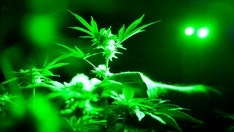Marijuana use surpasses alcohol for those under 18
Fox News correspondent Lucas Tomlinson has more on addiction concerns as child marijuana use soars 245% in the last 20 years on 'Special Report.'
New York stinks of weed. Everywhere you go – theater lobbies, parking lots, construction sites, delis, public parks – you can smell the bitter aroma of pot. Does anyone actually think this is good for our troubled city? Or for our country?
Can you imagine China encouraging drug usage that can permanently impair the intelligence of young people and that saps the productivity of workers? It is absurd, and yet (mainly) Democrats in financially wounded cities and states have rushed to legalize pot, grounding their campaigns on three questionable arguments:
1. That the war on drugs and prohibition against smoking pot led to racial inequities, which could only be corrected through legalization;
2. That selling weed and levying hefty taxes on those sales would plug the budget gaps of profligate cities and states; and
3. That marijuana was no more harmful than alcohol and therefore should be legal.
Are these assumptions true?
The widely disseminated claim that millions of Black Americans are unjustly in prison for simple pot possession is a myth. A 2015 study showed that in the federal prison system, which in 2020 housed 226,000 people, more than 99 percent of those sentenced for drug possession had originally been accused of trafficking or other crimes, but had been allowed to plead down to lesser charges.
President Joe Biden made a big show before the midterms of issuing a pot pardon, saying "No one should be in jail for possessing marijuana." He looked a tad foolish when it turned out there was literally not one person locked up in federal prisons for that offense.
CANNABIS IN US IS A ‘$100 BILLION OPPORTUNITY,’ TILRAY CEO IRWIN SIMON SAYS
A lengthy ACLU study of marijuana arrests concludes: "Black people are 3.64 times more likely than white people to be arrested for marijuana possession, notwithstanding comparable usage rates." Interestingly, even in the ACLU’s 110-page report, titled "A Tale of Two Countries: Racially Targeted Arrests in the Era of Marijuana Reform" there is no verification of the "comparable usage" assertion, which is pivotal to the overall claim of racial injustice. It is just assumed that Blacks and whites use marijuana at the same rate.
Since legalization, the number of young people smoking weed has steadily increased. Is this how we’re going to help our kids achieve their dreams?
The National Survey on Drug Use and Health, the apparent source for this assumption, actually shows marijuana consumption to be slightly higher among Blacks than whites. But the survey does not determine how frequently or regularly the person uses.
OVER 900 APPLY FOR NY STATE RECREATIONAL MARIJUANA LICENSES
An HHS study on alcohol and marijuana use disorders published for the National Library of Medicine concludes that white Americans abuse alcohol at higher rates than Blacks, but that African-Americans incurred marijuana dependence and abuse at nearly twice the rate of whites or Hispanics. Most likely, that suggests a higher level of usage.
These surveys do not prove the case, and the war on drugs may have targeted Blacks more aggressively than whites, but instead of providing proof of racism, higher arrest rates could reflect a higher preponderance of illegal marijuana dealers in the Black community, or that charging criminals with possession of an illegal substance was an easier case to prove than other misdeeds.
The second argument for legal weed is that communities like Colorado, one of the first states in the union to legalize pot for recreational use, needed revenues, and that taxing a booming new industry would help close budget holes delivered in part by out-of-control public employee unions.
For several years, the program worked. Colorado became the pot destination of choice, with sales of weed surpassing $2 billion in 2021 and tax collections totaling $423 million. But then other states began to legalize weed, and for the first seven months of 2022, revenues dropped 21 percent.
Pot dispensaries are closing in Colorado, delivery operations are shutting down, and, most important, school districts and other revenue recipients are taking a massive hit. As more states and communities legalize pot, the profit and tax opportunity will drop. That is already happening in Colorado, and it will happen elsewhere.
The final argument from cannabis proponents is that pot is no more harmful than alcohol. The jury is out.
We know that long-term usage by teens reduces their adult IQ by almost 6 points; in effect, steady pot consumption by kids makes them stupider. Since legalization, the number of young people smoking weed has steadily increased. Is this how we’re going to help our kids achieve their dreams?
CLICK HERE TO GET THE OPINION NEWSLETTER
We also know that in the four years after pot was legalized for recreational use in Colorado, cannabis-related emergency room visits jumped three-fold. Many of those emergencies stemmed from consumption of edibles where the THC (the main psychoactive ingredient in cannabis) content is unknown, and many of those visits involved children.
Selling pot to children is illegal, but kids often mistake THC-laced gummy bears or brownies for their favorite treat and end up sick.
Marijuana has become wildly more potent (and, many argue, more addictive) over time. In the 1990s the THC content of pot averaged 4%; today, in concentrates, it can be more than 80%. Dutch officials have classified potency above 15% as a "hard drug."
An activist group that focuses on protecting children claims that "Teens 12-17 who use marijuana are twice as likely to advance to substance use disorder than teens who use alcohol or tobacco." They also say that young people are more likely to drive after consuming pot than alcohol and that using marijuana products "with high THC potency is associated with higher rates of schizophrenia, psychosis and generalized anxiety."
CLICK HERE TO GET THE FOX NEWS APP
The legalization of pot is moving too fast, with desperate officials focused on revenues and not the welfare of their citizens. Twenty-one states and Washington, D.C. now allow recreational use of pot.
There is probably no turning this ship around, but those communities that have not yet taken the leap should look very hard at what awaits them on the other side.














































